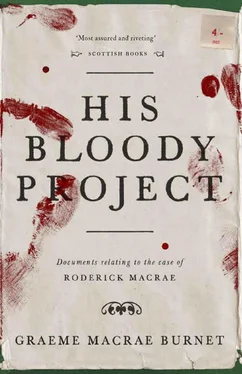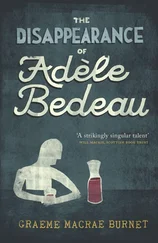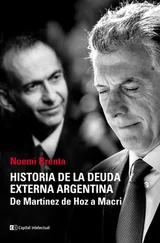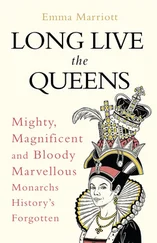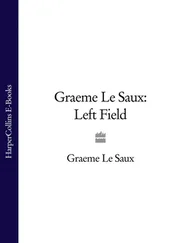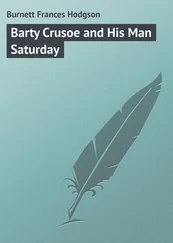Graeme Burnet - His Bloody Project
Здесь есть возможность читать онлайн «Graeme Burnet - His Bloody Project» весь текст электронной книги совершенно бесплатно (целиком полную версию без сокращений). В некоторых случаях можно слушать аудио, скачать через торрент в формате fb2 и присутствует краткое содержание. Год выпуска: 2015, Издательство: Contraband, Жанр: Современная проза, на английском языке. Описание произведения, (предисловие) а так же отзывы посетителей доступны на портале библиотеки ЛибКат.
- Название:His Bloody Project
- Автор:
- Издательство:Contraband
- Жанр:
- Год:2015
- ISBN:нет данных
- Рейтинг книги:5 / 5. Голосов: 1
-
Избранное:Добавить в избранное
- Отзывы:
-
Ваша оценка:
- 100
- 1
- 2
- 3
- 4
- 5
His Bloody Project: краткое содержание, описание и аннотация
Предлагаем к чтению аннотацию, описание, краткое содержание или предисловие (зависит от того, что написал сам автор книги «His Bloody Project»). Если вы не нашли необходимую информацию о книге — напишите в комментариях, мы постараемся отыскать её.
A brutal triple murder in a remote northwestern crofting community in 1869 leads to the arrest of a young man by the name of Roderick Macrae. There’s no question that Macrae is guilty, but the police and courts must uncover what drove him to murder the local village constable.
And who were the other two victims? Ultimately, Macrae’s fate hinges on one key question: is he insane?
His Bloody Project — читать онлайн бесплатно полную книгу (весь текст) целиком
Ниже представлен текст книги, разбитый по страницам. Система сохранения места последней прочитанной страницы, позволяет с удобством читать онлайн бесплатно книгу «His Bloody Project», без необходимости каждый раз заново искать на чём Вы остановились. Поставьте закладку, и сможете в любой момент перейти на страницу, на которой закончили чтение.
Интервал:
Закладка:
The Lord Justice-Clerk then addressed counsel. He was aware, he said, of the existence of the ‘so-called memoir’ written by the prisoner. As the account had not been produced under the proper cautions and contained admissions which the prisoner might not wish to make in the course of his defence, ‘neither the document nor any portion thereof’ were admissible in evidence. He further sternly advised both sides against making any reference to the document in the course of their examination of the witnesses. The case would be decided on the basis of the evidence heard in court and this evidence only. Neither the Solicitor-General nor the defence raised any objection to this ruling, which was no doubt intended by the judge to pre-empt any later discussion in the presence of the jury.
At five minutes past ten, accompanied by a ‘great uproar which the repeated striking of the Lord Justice-Clerk’s gavel did nothing to quell’, the prisoner was brought up to the dock. James Philby, reporting for The Times , described the moment:
Those awaiting the appearance of a monster were sorely disappointed. Once the initial tumult had died away, the most oft-heard remark was to the effect that the prisoner was no more than a boy. And, in truth, it was a most accurate observation. Roderick Macrae would be no one’s idea of a murderer and certainly did not appear capable of the monstrous acts of which he is accused, being of small stature, though well-built around the shoulders and chest. His hair was unkempt and his complexion, no doubt on account of the weeks spent in his cell, pallid. On entering, his dark eyes surveyed the court-room from beneath his heavy brow, but he appeared quite in possession of his senses and made no reaction to the hullabaloo from the public gallery. His advocate, Mr Andrew Sinclair, stood by the dock and instructed him to take his seat there and this he did, adopting a respectful posture, with his hands resting in his lap and his head bowed. He generally remained in this attitude throughout the proceedings.
The Clerk of the Court then read the indictment:
Roderick John Macrae, now or lately a crofter of Culduie, Ross-shire, and now or lately prisoner in Inverness, you are indicted and accused at the instance of James Moncrieff, Esq., Her Majesty’s Advocate for Her Majesty’s interest: that albeit, by the laws of this and of every other well governed realm, murder is a crime of an heinous nature, and severely punishable: yet true it is, and of verity, that you, the said Roderick John Macrae, are guilty of the said crime, actor, or art and part: In so far as, (1.) On the morning of the 10th day of August 1869, within the dwelling-house of Lachlan Mackenzie in Culduie, Ross-shire, did wickedly and feloniously assault and attack the said Lachlan Mackenzie, and did, with a croman and flaughter, strike the said Lachlan Mackenzie several blows about the chest, face and head, and did fracture his skull, by all which, or part thereof, the said Lachlan Mackenzie was mortally injured and immediately died, and was thus murdered by you the said Roderick John Macrae.
The indictment went on to similarly detail the assaults on Flora and Donald Mackenzie.
The Lord Justice-Clerk then instructed the prisoner to rise and addressed him:
‘Roderick John Macrae, you are charged under this indictment with the crime of murder. How say you: are you guilty or not guilty?’
Roddy stood with his hands at his sides, and after glancing towards his counsel replied in a clear, but quiet voice, ‘Not guilty, my lord.’
He resumed his seat and Andrew Sinclair rose to submit the Special Defence of Insanity. This was read by the Clerk of the Court: ‘The panel pleads generally not guilty. He further pleads specially that at the time at which the acts set forth in the indictment are alleged to have been committed he was labouring under insanity.’
Mr Philby wrote, ‘For a young man who had never previously ventured more than a few miles from his village, he did not seem unduly unsettled by the array of learned faces which now scrutinised him from the bench. Whether this was due to the insanity claimed by the defence or merely spoke of a certain sang-froid , it was not at this point possible to venture an opinion.’
The jury of fifteen men was then empanelled. The Lord Justice-Clerk instructed the jurors to dismiss from their minds anything they might have read or heard about the case and reminded them of their obligation to consider only the evidence to be set forth in the court-room. He then asked the jurors if any of them had formed a settled opinion about the case or laboured under any prejudice about it. The jurors replied in turn that they had not, and, at half past ten, the case for the prosecution was opened.
The first witness to be called was Dr Charles MacLennan, who had carried out the post-mortem examination of the bodies. The practitioner was dressed in a tweed suit and yellow waistcoat, and boasted drooping moustaches, which leant him a suitably sombre air. It was unlikely that, as a rural doctor, he had ever been called upon to take part in such proceedings and he appeared nervous as he entered the witness box. As he began his evidence, wrote Mr Murdoch for the Courier , ‘the festive atmosphere in the public gallery quickly dissipated and the gravity of the occasion overtook the room’.
To a hushed court-room, Mr Gifford led Dr MacLennan through a meticulous account, lasting some thirty minutes, of the injuries sustained by each of the three victims. At the conclusion of his testimony the doctor was shown Productions No. 1 and No. 2, a flaughter and a croman. The appearance of the murder weapons elicited gasps from the gallery. The blade of the flaughter was badly bent out of shape, testifying ‘to great force with which it had been wielded’.
The Solicitor-General then asked the witness, ‘Have you seen these items before?’
Dr MacLennan: ‘No, sir.’
‘Can you tell us what they are?’
‘They are a flaughter and a croman.’
‘And what would be their normal use?’
‘They would be used for breaking ground or otherwise tending a croft.’
Mr Gifford, a tall and distinguished man, impeccably attired in a black suit, here paused to give full weight to the question he was about to ask.
‘Now,’ he said, ‘in your professional opinion, and given your careful examination of the three victims in this case, would the injuries sustained be consistent with the use of these weapons?’
‘Most certainly,’ the doctor replied. ‘If used with sufficient force.’
Mr Gifford nodded solemnly.
‘If I might put one further question to you,’ he said, ‘how would you characterise the injuries to the deceased, I mean, in comparison with other cases you have examined?’
Dr MacLennan exhaled sharply, as if the answer was self-evident. ‘They were without question the most brutal I have ever had the misfortune to encounter,’ he said.
Mr Gifford then indicated that he had concluded his examination. If his intention had been to leave the jurymen in no doubt about the seriousness of the case before them, he certainly succeeded. Several of them, it was reported, looked quite ashen.
Mr Sinclair had no questions for the doctor and the witness was excused.
Roddy had listened to this evidence with some attention, but no show of emotion, ‘quite as if,’ wrote Mr Philby, ‘he were no more than an interested spectator’.
The next witness was Carmina Murchison. She wore a green taffeta dress and would not, The Scotsman noted, ‘have looked out of place in the salons of George Street’. Not a single newspaper omitted mention of Mrs Murchison’s striking appearance and Mr Philby was even moved to note that ‘no juryman with blood in his veins could doubt a word which emerged from such lips’.
Читать дальшеИнтервал:
Закладка:
Похожие книги на «His Bloody Project»
Представляем Вашему вниманию похожие книги на «His Bloody Project» списком для выбора. Мы отобрали схожую по названию и смыслу литературу в надежде предоставить читателям больше вариантов отыскать новые, интересные, ещё непрочитанные произведения.
Обсуждение, отзывы о книге «His Bloody Project» и просто собственные мнения читателей. Оставьте ваши комментарии, напишите, что Вы думаете о произведении, его смысле или главных героях. Укажите что конкретно понравилось, а что нет, и почему Вы так считаете.
